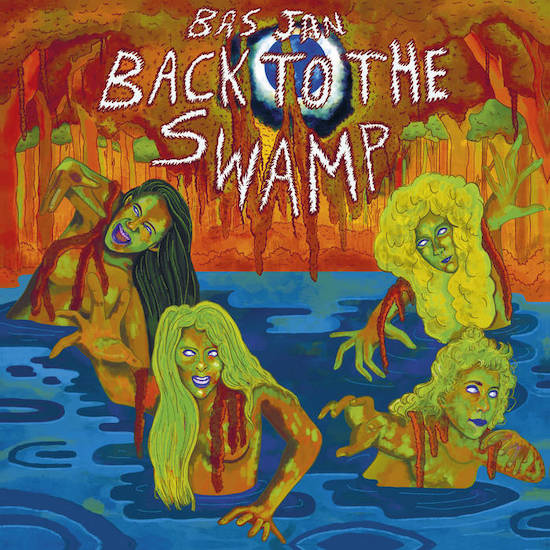The cover of Bas Jan’s third album features the four band members as blood-splashed zombies, staggering vengefully from a primeval swamp. The artwork is reminiscent of Return of the Giant Slits, and the precise, brittle songwriting on Back to the Swamp has The Slits’ second album as its musical godmother. But Bas Jan play cleverly with expectations. The songs on Back to the Swamp subtly draw in a variety of musical influences, while revelling in the supposed banality of everyday experience. Sarafina Steer’s deadpan vocals narrate lyrics that sound like internal monologues, about self-image, social pressure, relationships and depression. Yet anger simmers close to the surface, with tightly wound melodies and rhythms pressing against the surface of every track.
The band, expanded for the new album, is Serafina Steer, also known for her solo songwriting and harp-playing, Rachel Horwood, Emma Smith and Charlie Stock. Bas Jan’s strength has always been intelligent, ambiguous songs which find the extraordinary in the commonplace. Their music is appealing and disconcerting at the same time. They cite a range of intriguing influences, including Jon Hassell whose deceptively relaxed ambient instrumentation can be discerned throughout – for example on ‘Margaret Calvert Drives Out’, which uses spare piano and trumpet on a track about the designer of Britain’s road signs. It is a lovely, melancholy and oddly informative song, a five minute history lesson with more than a touch of Saint Etienne about it. They also reference Pet Shop Boys, somewhat at the other end of the musical spectrum, but it makes sense on tracks like single ‘At The Counter’ which is propelled by funky synthesisers.
‘At the Counter’ shows what Bas Jan are about, full of tension between monotony and revelation. Melodically irresistible, it is full of musical confidence but its swagger is filtered through a veil. The lyrics, which seem detached from reality – “I’m at the counter / I’m on the corner / I’m in the bedroom / Living my best life” – are unsettling, not least because the song is set in an out-of-town pet superstore. On ‘No More Swamp’ the singer tries to talk herself out of depression, but Back to the Swamp is a turmoil of returning conflicting emotions. However, ‘Cried A River’, a perfect, low-key ballad with layered backing harmonies and lyrical violin, is a no regrets break-up song – clear-eyed reflection on mistakes consigned to the past.
Bas Jan draw deeply on the emotional instability lurking just out of sight in modern life. At first listen, their music sounds almost casual, but it soon reveals musical and emotional depths that makes Back to the Swamp the kind of album that installs itself in your head without asking permission. Its nine tracks are all equally strong, something few bands pull off, and this is their best album to date. It is music that speaks to us right now, engaging head on with the weight of the world and illuminating it with flashes of light.


